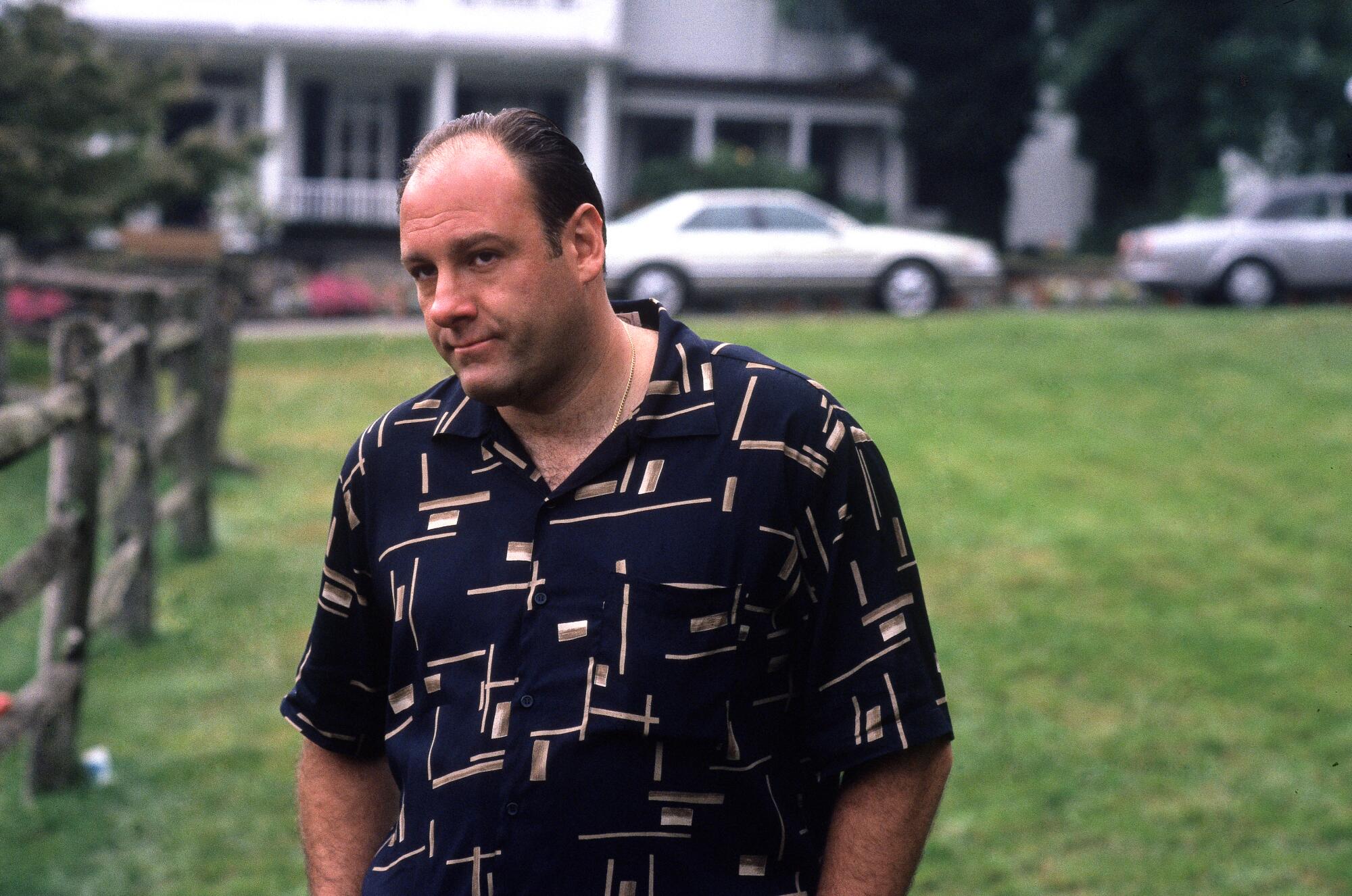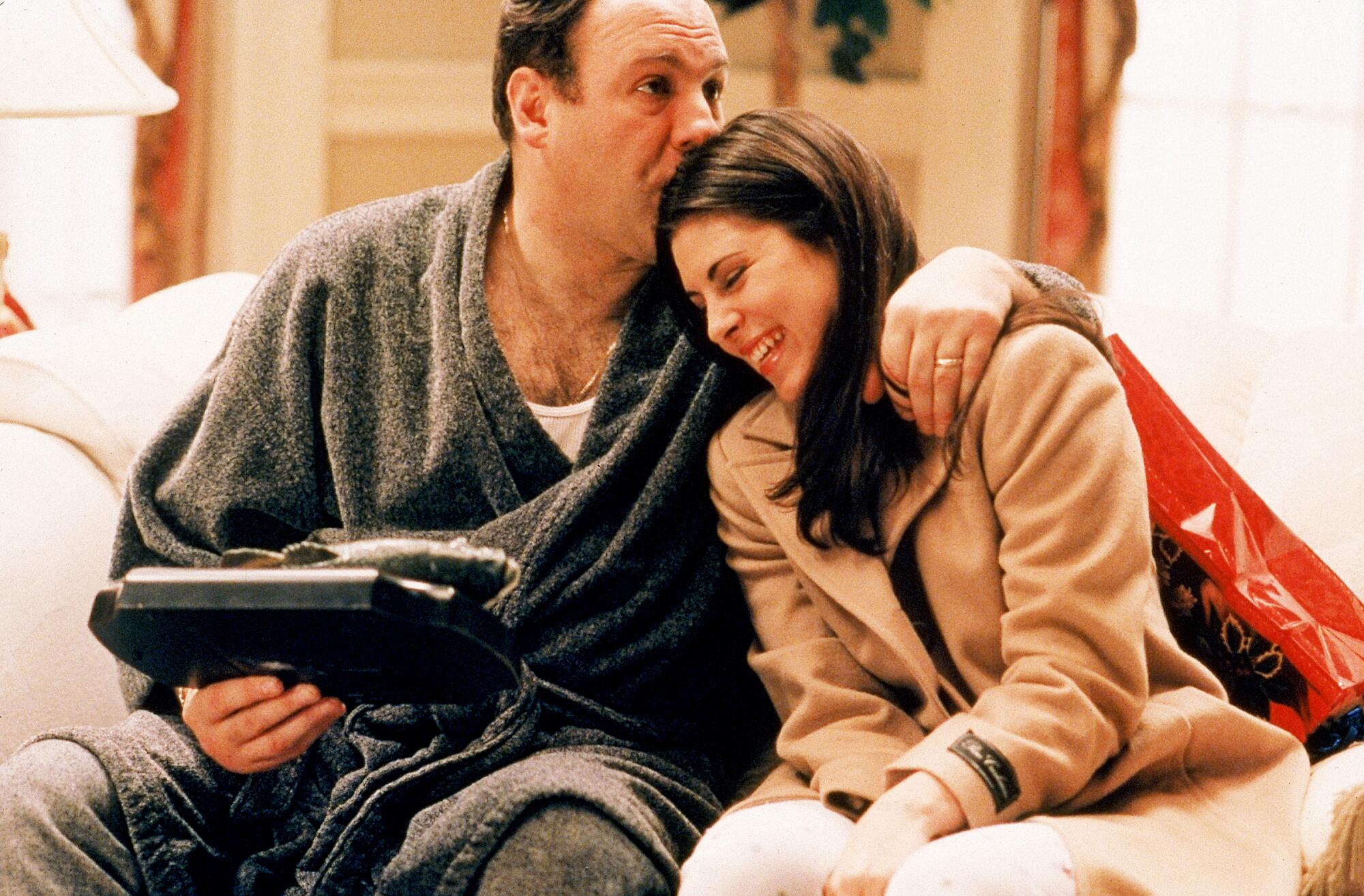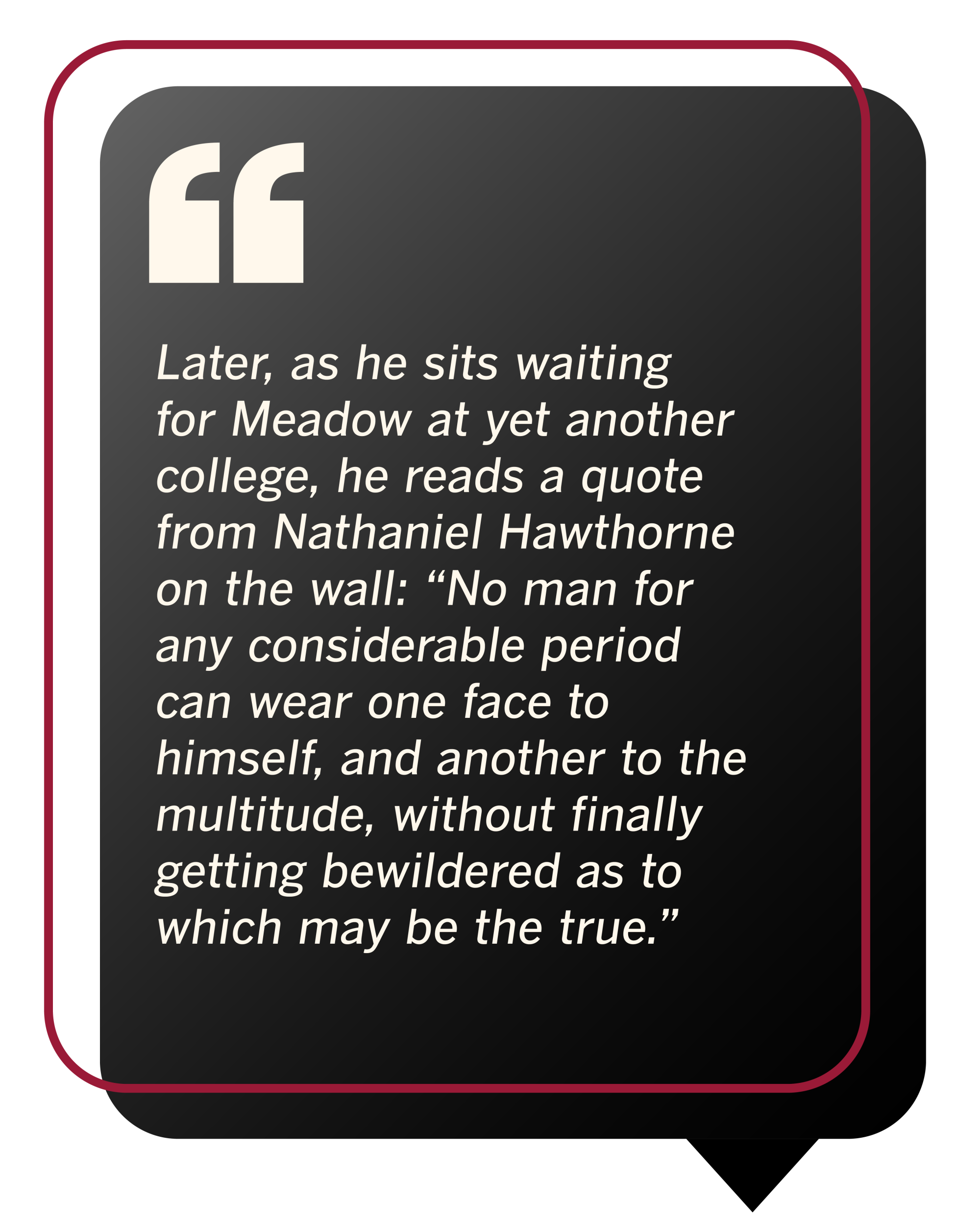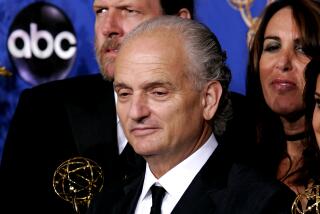Animation by Tomasz Czajka / For The Times; photographs from HBO
It only took an hour, on Feb. 7, 1999, for American television to change completely.
That day was the premiere of ‚ÄúCollege,‚ÄĚ the fifth episode of HBO‚Äôs new drama ‚ÄúThe Sopranos,‚ÄĚ and the world would never be the same. Every antihero and embattled family, every dark-as-night comedy and humanized-monster serial that made television the preeminent art form of the 21st century, can trace its roots directly back to ‚ÄúCollege.‚ÄĚ So too can many of the problems the TV revolution eventually unleashed.
For an hour, audiences watched open-mouthed as New Jersey mob boss Tony Soprano (James Gandolfini) took his spoiled but essentially sweet daughter, Meadow (Jamie-Lynn Sigler), on a college tour, only to glimpse, at a gas station, an FBI informant who put several of his friends in jail. What followed was a horrific yet often hilarious showcase of working-parent multitasking as Tony attempted to help his daughter sort out her future while, without her knowing, ending the informant’s.
With his bare hands.
The 1999 Project
All year we’ll be marking the 25th anniversary of pop culture milestones that remade the world as we knew it then and created the world we live in now. Welcome to The 1999 Project, from the Los Angeles Times.
Television‚Äôs definition of a leading man, the traditional limits of what stories the medium could tell and any notion of audience expectations went out the car window in ‚ÄúCollege,‚ÄĚ making room for everything from ‚ÄúBreaking Bad‚ÄĚ and ‚ÄúDexter‚ÄĚ to ‚ÄúTrue Blood‚ÄĚ and ‚ÄúGame of Thrones.‚ÄĚ
It‚Äôs important to remember that when ‚ÄúThe Sopranos‚ÄĚ debuted on HBO just one month earlier, it was treated like any other TV show. Yes, it got almost universally good reviews ‚ÄĒ The Times‚Äô then-critic Howard Rosenberg called it the ‚Äúseries of the season‚ÄĚ ‚ÄĒ but in several of those reviews ‚ÄúThe Sopranos‚ÄĚ didn‚Äôt even get top billing. Rosenberg paired it with the long-forgotten NBC drama ‚ÄúProvidence.‚ÄĚ The late, great Washington Post critic Tom Shales took down the Fox comedy ‚ÄúThe PJs‚ÄĚ before endorsing ‚ÄúThe Sopranos‚ÄĚ as a ‚Äúmob opera for people who think they‚Äôve had quite enough of the mob.‚ÄĚ
HBO was relatively new to the original scripted drama game ‚ÄĒ ‚ÄĚOz‚ÄĚ had premiered only two years before ‚ÄĒ and no one expected a platform called Home Box Office, which proudly declared ‚ÄúIt‚Äôs not television, it‚Äôs HBO‚ÄĚ to jump-start a revolution in a medium that was still considered lesser than film, never mind literature, theater or the fine arts.
Everyone was just excited that David Chase had breathed new life into the mob drama, in part by making his lead character so rattled by family tensions and a career in New Jersey‚Äôs ‚Äúwaste management‚ÄĚ that, after suffering a panic attack, he goes into therapy. (Something was definitely in the air that year: In March, Harold Ramis did the same thing at the actual box office with the comedy ‚ÄúAnalyze This,‚ÄĚ starring Billy Crystal and Robert De Niro, and was successful enough to spark a sequel, ‚ÄúAnalyze That.‚ÄĚ)

But anyone who thought ‚ÄúThe Sopranos‚ÄĚ was ‚ÄúThe Godfather‚ÄĚ on Prozac, or a paean to therapy as a solution to violent crime, realized, in ‚ÄúCollege,‚ÄĚ that this was much more than a mob opera. It was an excavation of the compartmentalized lives all of us live, to one extent or another.

Minutes into their road trip, Meadow asks her father point blank if he‚Äôs in the Mafia. Other children don‚Äôt find ‚Äú$50,000 in Krugerrands and a .45 automatic when they‚Äôre hunting for Easter eggs.‚ÄĚ After some inexpert fumbling ‚ÄĒ ‚ÄĚI‚Äôm in the waste management business, everybody assumes you‚Äôre mobbed up, it‚Äôs a stereotype, and it‚Äôs offensive‚ÄĚ ‚ÄĒ he offers her a classic parental half-truth: Some of his money comes from illegal gambling ‚Äúand whatnot.‚ÄĚ
Like so many children trying to face up to family secrets, Meadow wants to know but also does not; she accepts his mild description of violent organized crime, thrilled that her father has shared even that much with her.
You don’t have to be part of a mob family to recognize those dynamics.
Meadow also does some confessing of her own, revealing that she and her friends have tried speed. Tony predictably erupts, never mind that some of his business involves selling drugs.

On the road, Tony is also juggling phone calls to his angry mistress and his ailing wife, Carmela, who is busy confessing her sins, while attempting to add to them, with her handsome parish priest. (It‚Äôs the pre-mobile days so this involves a lot of pay phones, which inevitably ups the tension, and also the ‚ÄúI gotta make a call‚ÄĚ excuses.)
When Tony sees the snitch, some of those calls go to his nephew Christopher (Michael Imperioli), turning what was supposed to be a father/daughter bonding experience into a work trip. And if the ‚Äúwork‚ÄĚ involved is a bit more dramatic than, say, finishing up a contract, the basic tension is familiar to virtually every working parent.

Set alongside Carmela‚Äôs confession to the young priest that she believes her husband has committed ‚Äúhorrible acts,‚ÄĚ Tony‚Äôs throttling of the informant is appropriately brutal and drawn out, stripping away any pretense that Tony is somehow a kinder, gentler mobster. Previously, audiences had seen him make threats, throw punches and even break a guy‚Äôs leg, but in comparison to some of the other characters, including his own mother, Tony seemed more humane. His anxiety attacks, prompted by the flight of a family of ducks he had nurtured from his swimming pool, appeared to offer evidence that at some level he was not comfortable with the butchery his job required.
In ‚ÄúCollege,‚ÄĚ viewers were forced to acknowledge the brute in the man. Not only did Tony sentence a man to death the moment he saw him, he insisted on carrying out the sentence himself. With furious relish. After which he picked up his daughter from a fancy private university and lied to her face about what he had been up to, with no apparent guilt or reluctance.

Later, as he sits waiting for Meadow at yet another college, he reads a quote from Nathaniel Hawthorne on the wall: ‚ÄúNo man for any considerable period can wear one face to himself, and another to the multitude, without finally getting bewildered as to which may be the true.‚ÄĚ
In that moment, Tony appears neither defiant nor ashamed, only a little sad and, perhaps, resigned. He is a man with several faces for the multitudes; it’s the face he shows himself that remains shrouded. If action makes the man, who is he really?
Jaws dropped, viewers were asked to accept a different truth: that Tony Soprano is a vicious person who also deserves love and compassion, just as Carmela could be at once callous to others and desperate for intimacy. Never before had a television show asked so much of its audience. Never before had a television writer assumed that viewers would be capable of becoming attached to a character who in pretty much every other series would have been the bad guy.
Chase was pulling no punches, and we loved him for it. In Tony Soprano, many people saw a modern Everyman. Born into a toxic family, wanting a better life but unsure of how to get it, aware enough to have panic attacks but unable to really change, his tears for the baby ducks that flew away were just as real as the satisfaction he felt choking the life out of another human being.
Whether or not you admire the string of antiheroes and humanized monsters who followed in Tony Soprano‚Äôs wake ‚ÄĒ and an argument could be made that in loving Tony, we justified the worst in ourselves ‚ÄĒ the exquisite writing and acting of ‚ÄúCollege‚ÄĚ proved that television could ask the same questions, offer the same insights, disrupt predictable thinking just as well as all the other art forms. Even after 25 years, the episode remains a revelation. You can watch it without ever having heard of ‚ÄúThe Sopranos‚ÄĚ and still be mesmerized. As if it were a poem. As if it were a painting.
As proof, once and for all, that no story or character or circumstance had to be limited just because it was on TV.
More to Read
The complete guide to home viewing
Get Screen Gab for everything about the TV shows and streaming movies everyone’s talking about.
You may occasionally receive promotional content from the Los Angeles Times.









